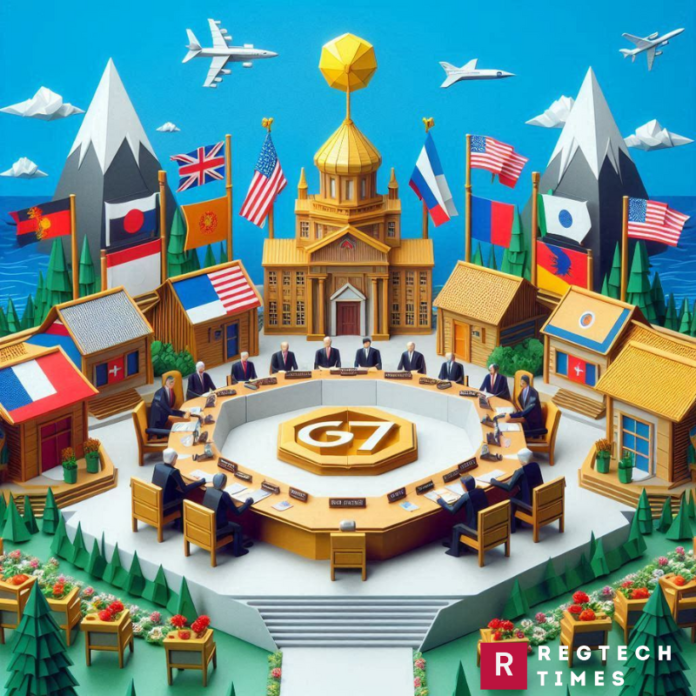As the G7 Summit convenes in southern Italy, the United States has intensified its sanctions on Russia, a move that underscores the group’s unified stance on the ongoing conflict in Ukraine. This escalation aims to cripple Russia’s war capabilities by targeting its financial institutions, technological access, and strategic resources. These measures are part of a broader international effort to pressure Moscow into ceasing its aggressive actions in Ukraine.
Broadened Sanctions on Financial Institutions
One of the critical components of the new sanctions is the expanded crackdown on banks dealing with sanctioned entities. Initially, in December, President Joe Biden signed an executive order targeting approximately 1,200 individuals and companies. This has now been extended to include around 4,500 entities, significantly broadening the scope of affected institutions.
The sanctions expose these banks to the risk of being cut off from the U.S. financial system, a deterrent meant to isolate Russia’s economy further. Peter Harrell, a former White House senior director for international economics, suggested that this approach “begins to look like an effort to set up a global financial embargo on Russia.”
Impact on the Moscow Exchange
The U.S. Treasury has also imposed sanctions on parts of Russia’s financial system, notably the Moscow Exchange, the country’s largest foreign exchange market. These sanctions have led to the halt of trading in U.S. dollars and euros on the exchange, disrupting a significant avenue for Russia’s international financial transactions.
Targeting Technology and Supply Chains
In addition to financial measures, the sanctions also aim to restrict Russia’s access to crucial technologies. This includes semiconductors and other tech products that have been found in Russian military equipment used in Ukraine. By targeting shell companies in Hong Kong that facilitate the supply of these technologies to Russia, the U.S. intends to cut off a critical supply line.
US Treasury Secretary Urges German Banks to Strengthen Compliance with Russia Sanctions
The sanctions extend to software and IT services, although the U.S. has clarified that these actions are not meant to disrupt civil society and civil telecommunications. The goal is to impair Russia’s ability to maintain its military operations and technological advancements.
OFAC Sanctions on SARLU is a Crippling Blow to Russia’s Mercenary Activities in Africa
Combating Gold Laundering
A significant new element in the sanctions is the crackdown on gold laundering. By targeting this practice, the U.S. aims to disrupt another financial avenue that Russia could use to sustain its economy and war effort. Gold has been a valuable asset for Russia, especially as sanctions have restricted other financial flows.
Gold Reserves Surge Amid Rising Sanctions Risk: IMF’s Gita Gopinath
Economic Implications and G7 Summit Goals
Despite these extensive sanctions, the International Monetary Fund (IMF) forecasts that Russia will achieve economic growth of 3.2% this year. However, analysts caution that over time, the cumulative effect of these sanctions will erode Russia’s economic base and its ability to sustain prolonged military engagements.
“Russia’s war economy is deeply isolated from the international financial system, leaving the Kremlin’s military desperate for access to the outside world,” stated Treasury Secretary Janet Yellen. She emphasized that the latest sanctions strike at Russia’s remaining avenues for international materials and equipment.
As the G7 leaders gather, boosting support for Ukraine remains a priority. The expanded sanctions are a clear signal of the group’s commitment to backing Ukraine’s resistance against Russia’s invasion, now entering its third year. The G7 Summit provides a platform for these leaders to coordinate their strategies, ensuring that the sanctions are effective and that support for Ukraine is unwavering.
G7 Meeting is Critical for Sanctions
The expanded sanctions on Russia, coinciding with the G7 Summit, reflect a concerted effort by the world’s leading economies to isolate Russia economically and technologically. By targeting financial institutions, technological supply chains, and illicit financial practices like gold laundering, these measures aim to undermine Russia’s war capabilities and pressure it into ending its aggression in Ukraine. As the G7 leaders deliberate, their unified stance and strategic actions are crucial in shaping the future of the conflict and supporting Ukraine’s sovereignty.


